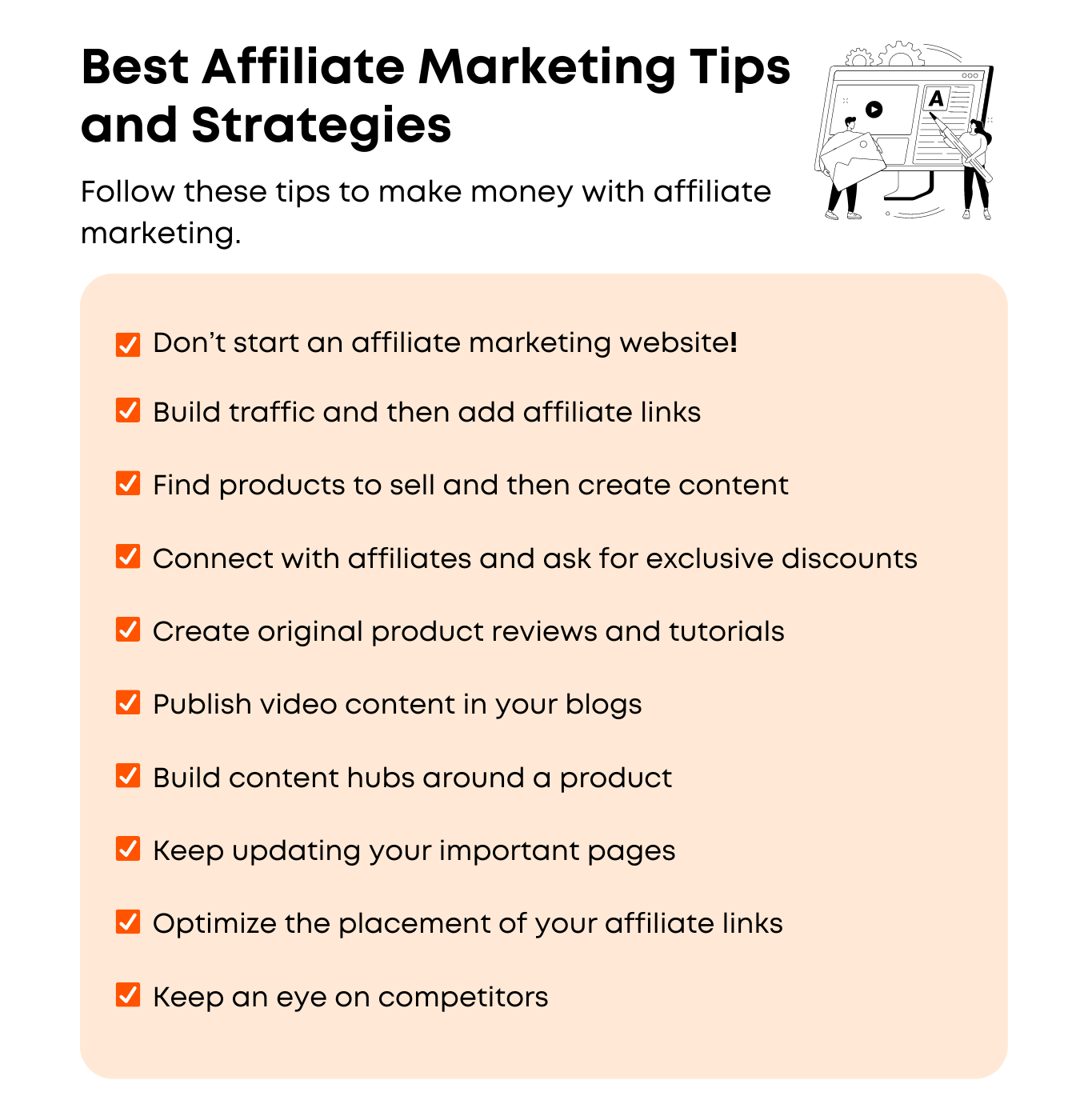Affiliate Marketing Beginners Guide: Unlock Earning Secrets!
Affiliate marketing involves promoting products and earning a commission on sales made through your referral. It's a popular way to make money online.
Affiliate marketing is a performance-based marketing strategy where you earn commissions by promoting other people's products or services. You start by choosing a niche you're passionate about. Afterward, you need to create valuable content on a platform like a blog or social media.
The next step is to find affiliate programs relevant to your niche and join them. Incorporate your affiliate links into your content, and focus on driving traffic to these links. Effective strategies include SEO, social media marketing, and paid advertising. With dedication and consistency, affiliate marketing can become a profitable venture.

Credit: www.wpbeginner.com
Diving Into Affiliate Marketing
Affiliate marketing is a powerful way to earn money online. It allows you to promote products and earn commissions. This guide will help you understand the basics and get started.
The Allure Of Passive Income
One of the biggest attractions of affiliate marketing is the potential for passive income. Once you set up your affiliate links, they can generate revenue around the clock. This means you can make money while you sleep!
Here's why passive income is so appealing:
- Flexibility: Work from anywhere, anytime.
- Scalability: Increase your earnings without increasing your workload.
- Diversification: Multiple income streams for financial security.
Essential Terms Every Marketer Should Know
Understanding key terms is crucial for success in affiliate marketing. Here are some terms you need to know:
| Term | Definition |
|---|---|
| Affiliate | A person who promotes products and earns commissions. |
| Merchant | The company selling the product. |
| Commission | The earnings you receive from each sale. |
| Link | A URL that tracks the affiliate's performance. |
| Conversion | A completed action, like a sale, tracked through the affiliate link. |
Knowing these terms will help you navigate the affiliate marketing landscape. This knowledge will also assist in communicating effectively with networks and merchants.
Laying The Groundwork
Starting your journey in affiliate marketing requires a solid foundation. This section will guide you through the initial steps to ensure long-term success. Let's break down the essentials.
Choosing The Right Niche
Choosing the right niche is crucial. A well-chosen niche can make or break your affiliate marketing efforts.
- Passion and Interest: Select a niche that you are passionate about. This keeps you motivated.
- Market Demand: Ensure there is a demand for products in your chosen niche. Research keywords and trends.
- Competition: Analyze the competition. Too much can be challenging; too little might indicate low demand.
- Profitability: Look for niches with high-paying affiliate programs. Check commission rates and product prices.
Below is a table summarizing factors to consider when choosing a niche:
| Factor | Description |
|---|---|
| Passion and Interest | Choose something you love. |
| Market Demand | Ensure people are searching for it. |
| Competition | Balance between too much and too little. |
| Profitability | High-paying programs are better. |
Understanding Different Affiliate Programs
Understanding different affiliate programs helps you choose the best opportunities. There are several types to consider:
- Pay-Per-Sale (PPS): Earn a commission each time a sale is made via your link. This is the most common type.
- Pay-Per-Click (PPC): Earn money each time someone clicks on your affiliate link. You get paid regardless of sales.
- Pay-Per-Lead (PPL): Earn a commission when a user signs up or provides their contact information.
Additionally, consider the following factors when evaluating affiliate programs:
- Commission Rate: Higher rates mean more income.
- Cookie Duration: Longer durations increase the chances of earning a commission.
- Product Relevance: Ensure the products align with your niche.
- Support and Resources: Look for programs that offer good support and promotional materials.
Establishing Your Platform
To succeed in affiliate marketing, you need a strong platform. Your platform is where you connect with your audience. It’s where you share content and promote products. Without it, reaching potential buyers is tough. Let's explore how to establish your platform effectively.
Blogging As A Powerful Tool
Blogging is a powerful tool for affiliate marketing. It allows you to create valuable content for your audience. A blog can attract organic traffic from search engines. This is crucial for reaching a wider audience. Use SEO techniques to rank higher in search results. This increases your visibility.
To start a blog, choose a niche. Focus on a topic you're passionate about. This makes content creation easier. Next, select a blogging platform like WordPress. It's user-friendly and offers many plugins. These can enhance your blog’s functionality.
Here are some tips for creating engaging blog content:
- Write informative articles that solve problems.
- Include high-quality images and videos.
- Use keywords naturally within your content.
- Ensure your posts are easy to read.
- Update your blog regularly.
Leveraging Social Media
Social media is another effective platform. It allows you to reach a large audience quickly. Popular platforms include Facebook, Instagram, and Twitter. Each platform has its unique features. Choose the ones that best suit your niche.
Here’s how to leverage social media for affiliate marketing:
- Create engaging profiles on chosen platforms.
- Share valuable content consistently.
- Use hashtags to increase your reach.
- Engage with your followers by responding to comments.
- Promote your affiliate products subtly.
Additionally, consider using social media ads. They can drive targeted traffic to your content. Make sure to track your performance. Use analytics tools to measure your success.
Finding And Joining Affiliate Programs
Starting with affiliate marketing can be exciting and rewarding. The first step is to find and join affiliate programs that align with your niche and interests. This guide will help you understand the process of selecting the right products and joining affiliate programs effectively.
Criteria For Selecting Products
Choosing the right products is crucial for your success. Here are some criteria to consider:
- Relevance: Ensure the product matches your niche and audience.
- Quality: Promote high-quality products to build trust with your audience.
- Commission Rate: Look for programs offering competitive commissions.
- Conversion Rate: Higher conversion rates mean more earnings for you.
- Cookie Duration: Longer cookie durations can lead to more sales.
| Criterion | Importance |
|---|---|
| Relevance | High |
| Quality | High |
| Commission Rate | Medium |
| Conversion Rate | High |
| Cookie Duration | Medium |
How To Join Affiliate Programs
Joining affiliate programs is a straightforward process. Here are the steps:
- Research: Find affiliate programs that fit your niche.
- Visit Affiliate Pages: Go to the website of the company and look for their affiliate program page.
- Sign Up: Fill out the application form with accurate information.
- Wait for Approval: Some programs approve instantly, others take a few days.
- Get Your Links: Once approved, get your affiliate links and start promoting.
Some popular affiliate programs include:
- Amazon Associates
- ShareASale
- ClickBank
- Commission Junction (CJ)
- Rakuten Marketing
Content Creation For Affiliates
Creating valuable content is crucial for affiliate marketing beginners. Focus on producing informative articles, engaging videos, and detailed product reviews to attract and retain an audience. Effective content creation can significantly boost your affiliate earnings.
Creating content for affiliate marketing can be challenging but rewarding. The goal is to craft engaging posts that attract readers and encourage them to click on your affiliate links. This section will guide you through the essentials of content creation, ensuring your affiliate marketing efforts are effective and profitable.Crafting Engaging Affiliate Content
To create engaging content, consider the following strategies:- Know Your Audience: Understand their needs and preferences.
- Research Keywords: Use tools like Ahrefs or Google Keyword Planner.
- Create Valuable Content: Offer solutions, tips, or insights.
- Use Different Formats: Mix blog posts, videos, and infographics.
- Be Authentic: Share your genuine experiences and opinions.
Incorporating Affiliate Links Naturally
Adding affiliate links naturally is crucial. Here are some tips:- Contextual Links: Embed links within relevant content.
- Use Call-to-Actions (CTAs): Encourage readers to click with compelling CTAs.
- Disclose Affiliations: Be transparent about your affiliate relationships.
- Avoid Overloading: Don’t clutter your content with too many links.
- Test Links: Ensure all links work and lead to the correct products.
| Method | Benefit |
|---|---|
| Contextual Links | Seamless integration within content |
| Call-to-Actions (CTAs) | Encourages reader interaction |
| Disclosure | Builds trust with your audience |
| Limited Links | Prevents overwhelming the reader |
| Testing | Ensures functionality and accuracy |

Credit: www.baranmotor.com
Driving Traffic To Your Affiliate Links
Driving traffic to your affiliate links is crucial for a successful affiliate marketing strategy. The more visitors you attract, the higher your chances of earning commissions. But how do you get people to click on your links? Here are some effective methods to boost traffic and enhance your affiliate marketing efforts.
Seo Strategies For Affiliate Marketing
Search Engine Optimization (SEO) is a powerful tool to drive organic traffic. By optimizing your content, your site can rank higher on search engines like Google. Here are some key SEO strategies:
- Keyword Research: Use tools like Ahrefs or Google Keyword Planner to find relevant keywords.
- On-Page SEO: Optimize titles, meta descriptions, and headers with target keywords.
- Quality Content: Create valuable content that answers users' queries.
- Backlinks: Build links from reputable sites to increase domain authority.
Utilizing Social Channels For Traffic
Social media platforms can significantly drive traffic to your affiliate links. Each platform has unique features that you can leverage:
| Platform | Strategy |
|---|---|
| Join niche groups and share valuable content with your links. | |
| Use stories and posts to promote products with swipe-up links. | |
| Tweet engaging content with hashtags to increase visibility. | |
| Create pins with affiliate links that lead to your content. |
Engage with your audience on social media by responding to comments and messages. Build a community around your niche, and people will be more likely to trust and click your affiliate links.
Conversion Tactics
Conversion tactics are essential for turning your website visitors into buyers. As an affiliate marketer, your goal is to maximize conversions. This section covers effective strategies to achieve higher conversion rates.
Turning Visitors Into Buyers
Turning visitors into buyers involves understanding your audience. Know their needs and preferences. Use this knowledge to create compelling content.
- Engaging Content: Write informative and engaging content. Use simple language.
- Clear Call-to-Actions (CTAs): Place CTAs strategically. Make them visible and persuasive.
- Trust Signals: Include reviews and testimonials. Build trust with your audience.
- Visuals: Use high-quality images and videos. Visuals attract and retain attention.
Optimizing For Higher Click-through Rates
Higher click-through rates (CTR) are crucial for affiliate success. Optimize your content to encourage more clicks on your affiliate links.
- Headlines: Write attention-grabbing headlines. Make them relevant and specific.
- Link Placement: Place affiliate links naturally within your content. Avoid clutter.
- Button Text: Use action-oriented text for buttons. Example: "Buy Now" or "Learn More".
- Mobile Optimization: Ensure your site is mobile-friendly. Many users browse on mobile devices.
Below is a simple table summarizing these tactics:
| Conversion Tactic | Action |
|---|---|
| Engaging Content | Write informative and engaging posts |
| Clear CTAs | Place visible and persuasive call-to-actions |
| Trust Signals | Include reviews and testimonials |
| Visuals | Use high-quality images and videos |
| Headlines | Write attention-grabbing headlines |
| Link Placement | Place links naturally within content |
| Button Text | Use action-oriented button text |
| Mobile Optimization | Ensure site is mobile-friendly |
Scaling Your Affiliate Marketing Business
Scaling your affiliate marketing business is crucial for long-term success. It involves expanding your reach, increasing revenue, and optimizing operations. Here, we explore strategies for long-term growth and the importance of diversifying your affiliate portfolio.
Strategies For Long-term Growth
To achieve sustainable growth, you need effective strategies. Below are some key strategies for long-term growth:
- Focus on Quality Content: Create high-quality, valuable content for your audience. This builds trust and engagement.
- SEO Optimization: Optimize your content for search engines. Use relevant keywords and meta descriptions to boost visibility.
- Email Marketing: Build an email list. Send regular newsletters and updates to keep your audience engaged.
- Social Media Presence: Be active on social media platforms. Share content and interact with your audience.
- Analyze Data: Use analytics tools to track performance. Adjust strategies based on data insights.
Diversifying Your Affiliate Portfolio
Diversifying your affiliate portfolio reduces risk and increases revenue streams. Here’s how to diversify effectively:
| Strategy | Description |
|---|---|
| Multiple Niches | Promote products in various niches. This reduces dependency on a single market. |
| Different Affiliate Programs | Join multiple affiliate programs. This ensures steady income from various sources. |
| Content Varieties | Create different types of content. Use blogs, videos, and social media posts to reach diverse audiences. |
By implementing these strategies, you can scale your affiliate marketing business successfully. Focus on quality content, SEO, and diversification for long-term growth.
Common Challenges And Solutions
Affiliate marketing can be a rewarding venture, but it is not without its challenges. Beginners often face obstacles that can seem insurmountable. Here, we will discuss some common challenges and provide practical solutions to help you navigate the affiliate marketing landscape successfully.
Overcoming Beginner Obstacles
Starting as an affiliate marketer can be overwhelming. Here are some common obstacles and ways to overcome them:
- Understanding the Basics: Many beginners struggle with understanding how affiliate marketing works. Solution: Invest time in online courses or free resources to build a solid foundation.
- Choosing a Niche: Picking the right niche can be daunting. Solution: Identify your interests and research profitable niches using tools like Google Trends.
- Generating Traffic: Newcomers often find it hard to drive traffic to their sites. Solution: Utilize SEO techniques, social media marketing, and paid ads to boost visibility.
Staying Ahead In A Competitive Niche
Affiliate marketing is highly competitive. To stay ahead, consider these strategies:
- Unique Content: Create unique, high-quality content that offers value to your audience. Use multimedia elements like videos and infographics.
- SEO Optimization: Optimize your content for search engines. Use keywords, meta descriptions, and alt tags effectively.
- Networking: Connect with other affiliate marketers and influencers. Collaborations can help you reach a broader audience.
Let's break down some key points in a table format for better clarity:
| Challenge | Solution |
|---|---|
| Understanding Basics | Invest in online courses or free resources |
| Choosing a Niche | Identify interests and research profitable niches |
| Generating Traffic | Utilize SEO, social media, and paid ads |
| Creating Unique Content | Offer value with high-quality and unique content |
| SEO Optimization | Use keywords, meta descriptions, and alt tags |
| Networking | Connect with other marketers and influencers |
By addressing these common challenges with effective solutions, you can build a successful affiliate marketing business. Remember, persistence and continuous learning are key to staying ahead in this dynamic field.
Tools And Resources For Affiliate Marketers
Starting as an affiliate marketer can be challenging. Having the right tools and resources makes the journey smoother. This section covers essential software for tracking and analysis, and educational resources for continuous learning.
Essential Software For Tracking And Analysis
Using the right software helps track performance and analyze data. It ensures you make informed decisions.
| Software | Description | Benefits |
|---|---|---|
| Google Analytics | Tracks website traffic and user behavior. |
|
| ClickMeter | Monitors affiliate links and conversions. |
|
| SEMrush | Offers SEO and competitive analysis. |
|
Educational Resources For Continuous Learning
Continuous learning is key to success in affiliate marketing. Here are some top resources to stay updated and enhance your skills.
- Affilorama: Offers free video lessons on various aspects of affiliate marketing.
- Udemy: Provides paid courses with comprehensive content on affiliate marketing strategies.
- Pat Flynn's Smart Passive Income: Shares valuable blog posts and podcasts on affiliate marketing.
- Neil Patel's Blog: Offers insights and tips on digital marketing, including affiliate marketing.

Credit: www.etsy.com
Frequently Asked Questions
How Do I Start Affiliate Marketing As A Beginner?
Start by choosing a niche. Build a content platform like a blog or YouTube channel. Join affiliate programs. Create valuable content. Drive traffic to your affiliate links.
Can I Teach Myself Affiliate Marketing?
Yes, you can teach yourself affiliate marketing. Online resources, courses, and tutorials are available to help you learn.
Is Affiliate Marketing Hard For Beginners?
Yes, affiliate marketing can be challenging for beginners. It requires learning, patience, and consistent effort to succeed.
Which Affiliate Marketing Is Best For Beginners?
Amazon Associates is best for beginners. It's user-friendly, offers a vast product range, and provides easy-to-use tools.
Conclusion
Starting affiliate marketing can be a rewarding venture. It requires dedication, strategic planning, and continuous learning. By following this guide, beginners can build a solid foundation for success. Remember to choose your niche wisely, create valuable content, and promote products that align with your audience's interests.
Happy marketing!